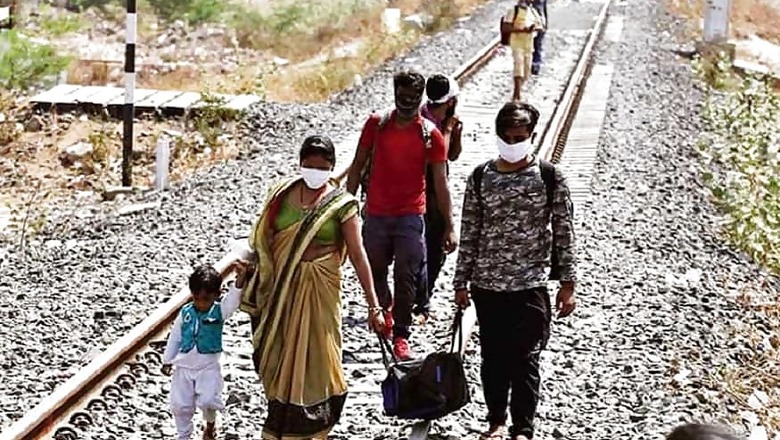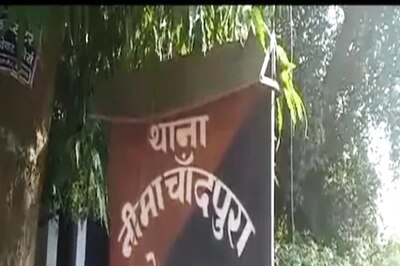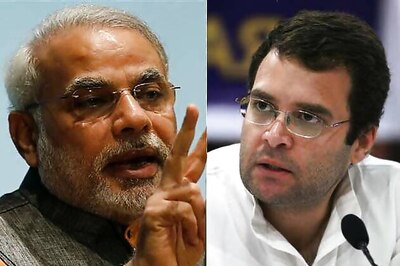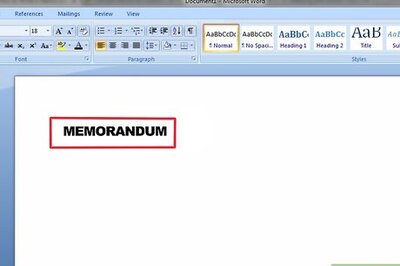
views
“Kahan chale gaye the?” said Bihar Chief Minister Nitish Kumar during his daily video conference with labourers at one of the quarantine centres in Muzaffarpur on Saturday. A welcome statement of affection at a time when the CM has come under the radar for allegedly not caring about his migrant workers.
A policy approach corresponding to the sentiment has been adopted by the state. With the migrant workforce largely unaccounted for, the Bihar government is preparing a draft for signing MoUs with employer states if the labour force decides to return back for work.
Over the last three days, similar video conferences are being held regularly. Sources in the Bihar government say 30 lakh migrant workers are expected to return by the end of May.
Meanwhile, officers who have been asked to prepare the draft for MoUs told News18, “It’s for state to play the role of go between, several state Chief Secretaries have been in touch with us saying that they can’t get industries back on track if the labour doesn’t return. The state wants to formalise this for the respect of the Bihari migrants, who have built big cities.”
This MoU will look after the interests of the migrants in the form of insurance, accommodation and other aspects of social security. Sources say that the skill mapping of labourers in the quarantine centres have begun which will ensure that the state can prepare a database of its migrants — an exercise which has never been carried out before. Sources say, migrants have been told to submit their phone numbers and Aadhaar card details.
As many as 8,64,000 labourers are back in the state and have been stationed in 11,218 quarantine centres across 38 districts. The concern for the state is also the fact that one out of four migrants have tested positive for Covid-19. Bihar government data shows that most of the labourers back from Maharashtra, Gujarat and Delhi have tested positive.
“Is health infrastructure Bihar specific issue? Then why are most from Surat and Mumbai have tested positive,” said a top state government official to News18.
Until now, the Chief Minister has drawn serious flak for his handling of the migrant crisis. In a meeting of CMs with the Prime Minister on April 29, Kumar was firmly against bringing back those from his state who were stranded elsewhere in the country. He had described the proposition as "an injustice to the principle of lockdown." He was alone among major states in doing little to bring students and migrant workers back to Bihar.
The dissatisfaction was also clear among labourers. News18 had earlier reached out to several skilled and semi-skilled workers from Bihar who had expressed their displeasure with the state government.
An indication of the sentiment among migrant workers towards CM Kumar may also be drawn from a video that surfaced on April 15. "We want to convey this to you that talk to PM Modi and arrange special buses to ferry us to Bihar...Open your ears and listen to us carefully...otherwise, the ground beneath your feet will sink away..." said a group of workers from Bihar in a video posted on social media. They were stranded at Badarpur border in Delhi.
Lack of employment is one of the biggest drivers of migration in the state. Unemployment rate in Bihar was at 10.3 per cent last year and ranked among the highest in the country. According to CMIE, the state's unemployment rate increased by 31.2 percentage points, rising to 46.6 per cent in April 2020, almost twice the national average.
According to a February 2020 study by Institute of Population Sciences, more than half of the households in Bihar are exposed to migration to more developed places in India and abroad. The survey, which covered 36 villages and 2,270 households revealed that migration is highest for landless households. The report further found that 80 per cent migrants are landless or have less than one acre of land.
Noted economist, Jean Dreze in a recent interview stated that Bihar will be worst hit due to reverse migration.
"Bihar is the biggest worry in the next couple of months. It has huge numbers of landless labourers. Being a caste and class-ridden society, some communities are leading hand-to-mouth existence even at the best of times," he said.
According to Census 2001, 28.5 lakh individuals migrated out of Bihar. The National Sample Survey of 2007-08 pegged the proportion higher. It noted that 5.64 per cent of the population moved out of the state.
The 2011 Census found that Uttar Pradesh and Bihar are responsible for the most number of migrants as 2.9 crore people moved out from the two states.
The 64th round of the National Sample Survey stated that around 30.7 per cent of the total out-migrants from Bihar moved in search of employment, as they could not find work.
Added to this, Bihar has consistently been one of India's poorest states ever since independence.
The mass reverse migration has also resulted in drying of remittances. An average migrant worker from Bihar sends Rs 2,100 on a monthly basis back home. Bihar gets the second highest domestic remittance in the country. The state received Rs 9,53,61.300 in March 2017. Remittances account for close to 5 per cent of the entire state's GDP.
To understand the importance of the money sent home, consider this: according to the National Sample Survey 2007-08, 70 per cent of the remittances in Bihar are used to procure food items. The remaining is consumed in household maintenance and healthcare.
The latest Economic Survey of the state notes, "admittedly, remittances from migrant workers have positive impact on consumption demand."
Back in the state, Santosh Kumar, a resident of Madhubani district had told News18, "My elder brother is in Kerala ever since the lockdown. He used to send close to Rs 5,000 every month. I work as an agricultural labour and earn only during the seasons. He has not been able to send money. We hope he returns home as soon as possible but the financial struggle will be huge this year."
Finance Minister Nirmala Sitharaman as part of her economic stimulus package earlier in the month had announced launch of 'one nation, one ration card' that will benefit migrant labourers who are currently either outside their states due to the lockdown or have no access to fair price shops where they are registered. Along with this, the Centre will also provide food grains to those migrants who have no ration cards for the next 2 months.
Ritu Dewan, Vice President of the Indian Society of Labour Economics, and former President of the Indian Association for Women's Studies had earlier told News18, "There are so many camps that have been set up. They can easily be turned into production units. There is need for so many masks and gloves that can be home produced. These camps can be used to produce them and in turn can earn wages. It will take care of demand and consumption issues and help mitigate the migrant to a certain extent."
Meanwhile, CM Nitish Kumar had last month spoken about skill-training at the quarantine centres. "Many projects underway in Bihar happen to be labour-intensive. Once the dust settles down, a survey should be conducted to assess the skills these migrant labourers might have and they should be absorbed in the workforce accordingly," he said.
Citizens of Bihar also have a dual task at hand. Currently in the midst of braving a draining global pandemic, they might have to elect a government within six months.
At a time when protectionism is the new buzz word in globalisation and Indian states too are drawing boundaries, will these MoUs mean a new chapter in state relationships which could give dignity to the labour force?




















Comments
0 comment